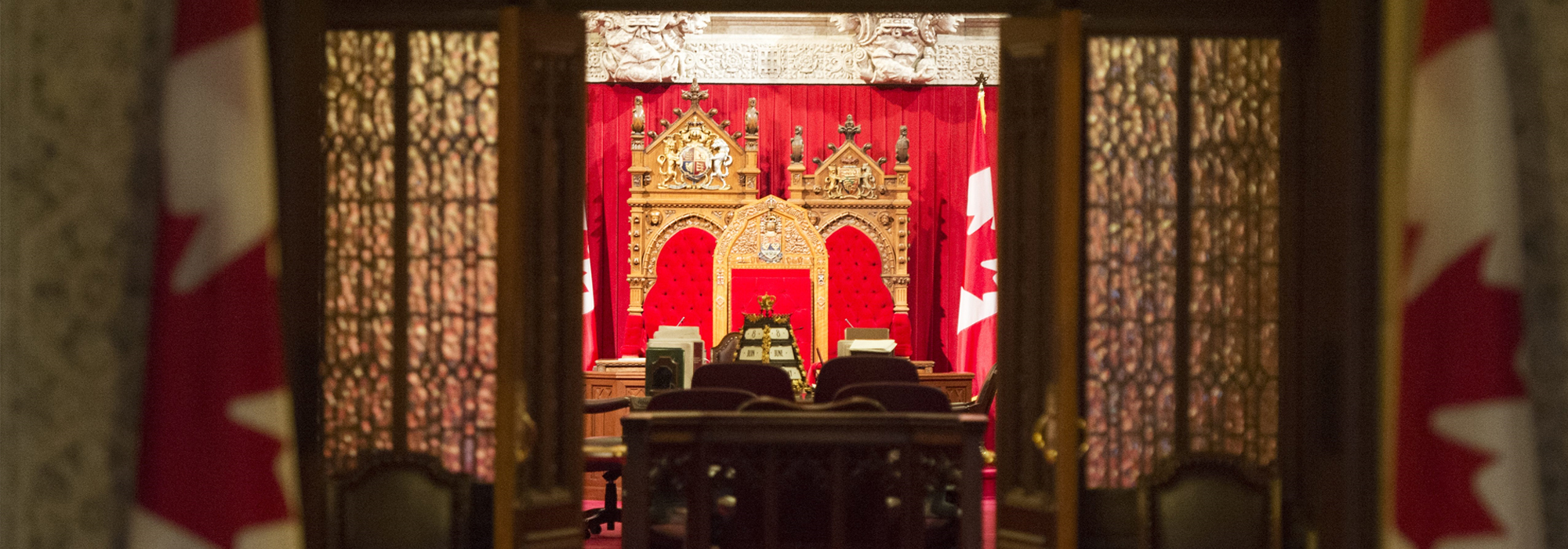
For decades, the Senate went about its work in reviewing and improving government legislation. It initiated landmark studies on health care, aging, marijuana, poverty, social cohesion and mental health. The Senate was not idle. At times, the work of senators yielded exceptional and influential contributions to public policy. However, a damaging period of corrosive partisanship, assorted scandals, and executive interference has left the chamber of “sober second thought” with a nasty hangover.
And yet, the spotlight on the Senate these past few years has opened the door to opportunity. In the wake of the controversies, wise senators appointed by previous prime ministers launched some laudable initiatives to modernize the Senate. A shining example is the establishment of the Special Senate Modernization Committee, a forum for meaningful debate on how to modernize Canada’s Upper House.
One of the most pressing challenges for this Committee is to make procedural obstruction to sober second thought a thing of the past. The deployment of tactics of delay for partisan motives is increasingly out of step with the changing identity of the Chamber. The Senate will need to ensure that it reviews and decides upon legislation in a reasonable time. This is easier said than done. In a policy paper submitted to the Special Senate Modernization Committee, I have proposed an innovative process that would both reduce obstruction that is driven by partisan interests and enhance substantive policy debate in the Senate.
There is no guarantee of success for a less partisan and more independent Senate, as former senators Michael Kirby and Hugh Segal reminded us in their report A House Undivided: Making Senate Independence Work. They note, “Success will depend on the wisdom and flexibility of the men and women who have been called upon to serve in the Senate: the objectives they pursue, the operational processes they choose, the goodwill they can muster in a house raised with partisan division and, increasingly in recent decades, dependent on direction from their party leaders in the House of Commons.”
Public support for an independent Senate is likely to come only if the chamber is able to achieve policy successes over the next few years. Should the emerging consensus be that a Senate composed of independent members has not proven capable of processing government business effectively and appropriately, then an eventual reversal to disciplined top-down control of the Senate will be more likely.
The erosion of sober second thought
With the appointment of independent senators, there is no longer a government caucus in the Senate. The Opposition seems to have taken advantage of this power vacuum. Without a government caucus to counter its obstruction, the Opposition has practically free rein to delay, delay, and delay further. Its leadership stalls progress through the constant adjournment of debate. When the government attempts to force votes in order to move legislation forward, the Opposition threatens to filibuster.
Though the Opposition leadership would contend that its members are merely exercising their rights in accordance with parliamentary practice and procedure, these rights should not be exercised irresponsibly.
Canadians must be able to trust that the government’s legislation will be reviewed by both houses of Parliament within a reasonable time. Indeed, at Westminster, the House of Lords is bound by a longstanding convention to that effect. And in other countries, second chambers are also disciplined by strict time limits for the review of government legislation. In those countries, if the upper house has not reached a decision within the set time, a bill is deemed to have passed automatically. Not so in the Canadian Senate. In theory, the Senate can delay passage of a bill virtually indefinitely.
As an example of these delays, Bill C-6 has been in Senate limbo since June, 2016. This bill would implement a Liberal electoral promise to repeal provisions of the Citizenship Act that increased the barriers to citizenship and created two-tier citizenship for dual nationals. The bill idled at second reading from September to December 2016. Within that time, only four Opposition senators spoke. That’s one speaker per month. Ironically, under the previous government the controversial provisions of the Citizenship Act that Bill C-6 would repeal were expedited through the Senate and adopted after only two sitting days of debate.
Bill C-16’s slow progress is another prime example of Opposition obstruction. This legislation seeks to recognize and reduce the vulnerability of transgender Canadians and to affirm their equality in society. It would include prohibiting discrimination on the basis of gender identity and gender expression in the Canadian Human Rights Act and making it illegal to discriminate on the basis of gender identity in the workplace. It would also extend criminal law protections against hate speech to transgender Canadians.
The bill arrived in the Senate in November, but has remained in limbo ever since. It took three months and considerable public pressure before a Conservative Opposition member spoke to the bill, despite there being ample opportunity for senators from all sides to join the debate. In the meantime, transgender Canadians are kept waiting for basic equality rights. Each day a bill like this is delayed, justice is denied. Reviewing legislation is not a game, and obstruction may have moral consequences.
These delaying tactics have not been limited to government legislation. Adjournment of debate has been zealously deployed to prevent the progress of Senate modernization efforts that would confer full and equal rights to senators who choose to organize themselves along nonpartisan lines. A report of the Senate Modernization Committee tabled in October 2016 recommended that the Senate extend to nonpartisan parliamentary groups the same status as party-affiliated caucuses. Yet up to now there has been not an iota of progress on this recommendation.
The Opposition has also adopted the practice of ambushing committees and the Chamber with unannounced last-minute amendments to government legislation, leaving Senators with little or no time to study the proposals. The most egregious example of this was when the Opposition majority on the Senate’s National Finance Committee attempted to rewrite Bill C-2, the middle-class tax cut — a central Liberal campaign commitment — with no advance warning. The Speaker of the Senate ruled the amendment out of order because the Senate does not have the power to tax Canadians.
In short, sober second thought has become a game of procedural cat and mouse.
Currently, the tactical approach of the Opposition undermines the credibility of well-intended Conservative senators’ substantiated policy arguments. It does their political creed no credit. Delay hardens hearts, but debate can change minds.
A way forward
The Senate must reconcile its practices and procedures with its increasingly independent membership.
It needs to solidify its position as a complementary, more deliberative and less tactical Chamber of Parliament. It must find a way to safeguard debate but also assure Canadians that the Chamber will actually come to informed decisions. In other words, the Senate has to collectively rethink the process and pacing of sober second thought.
Currently, the progress of government bills is managed through the ‘usual channels,’ back-room negotiations among the leaders of the Senate caucuses. Bill sponsors, critics and committee chairs are on the receiving end of the fait-accompli yielded through these negotiations. But the dynamics of the increasingly nonpartisan and independent Senate are at odds with this approach.
A significant innovation would be to create a more inclusive formal body mandated to organize chamber processes, streamline debates and provide a forum for agreement to be reached on the scheduling of Senate debates. Many legislatures have created such formal bodies, often referred to as “business committees.”
Such bodies are frequently used in proportionally elected legislatures, where the sheer diversity of political actors calls for a more collaborative planning of Chamber affairs than do two-party systems. For example, in New Zealand, a business committee was established as part of sweeping institutional change.
In 1996, New Zealand’s electoral system transitioned from the traditional first past the post (FPTP) to mixed member proportional representation (MMP), thereby weakening the duopoly of New Zealand’s two main parties (National and Labour) in the 120-member House of Representatives. Under FPTP, with its frequent single-party majority governments, the business of Parliament had been managed through a backroom process similar to that of the ‘usual channels’.
But the National and Labour parties would now have to share their power with minor parties. To expand the House’s decision-making tent and reflect the new diversity of voices, a business committee was created to organize the business of the House of Representatives. A more independent Canadian Senate could draw upon this example as it transitions from a duopoly of Conservatives and Liberals to a more diverse and polycentric membership.
The business committee would be mandated to establish tailor-made schedules for each bill’s progress through each stage of the legislative process. The scheduling could be flexible and – most importantly – designed to safeguard substantive policy debate. For example, a schedule adopted prior to or immediately following First Reading of a government bill would provide the number of days or sitting weeks to be spent at each stage: Second Reading debate, Committee Stage, Report Stage, and Third Reading, along with the period of time required for senators to prepare for each stage. The goal should be not to hasten the passage of a bill but to establish a sound framework for sober second thought.
A business committee would enable Canada’s Senate to establish a more transparent, collaborative and open process for the scheduling of legislative review. Rather than remain at the mercy of delay tactics, key decisions about the management of time in the Senate would be handed to all senators.
The Senate must debate and deliberate, but must also decide. Canadians expect it.
Photo: The Senate Chamber pictured on Parliament Hill in Ottawa on Tuesday, June 9, 2015. Matthew Usherwood/The Canadian Press
Do you have something to say about the article you just read? Be part of the Policy Options discussion, and send in your own submission. Here is a link on how to do it. | Souhaitez-vous réagir à cet article ? Joignez-vous aux débats d’Options politiques et soumettez-nous votre texte en suivant ces directives.









